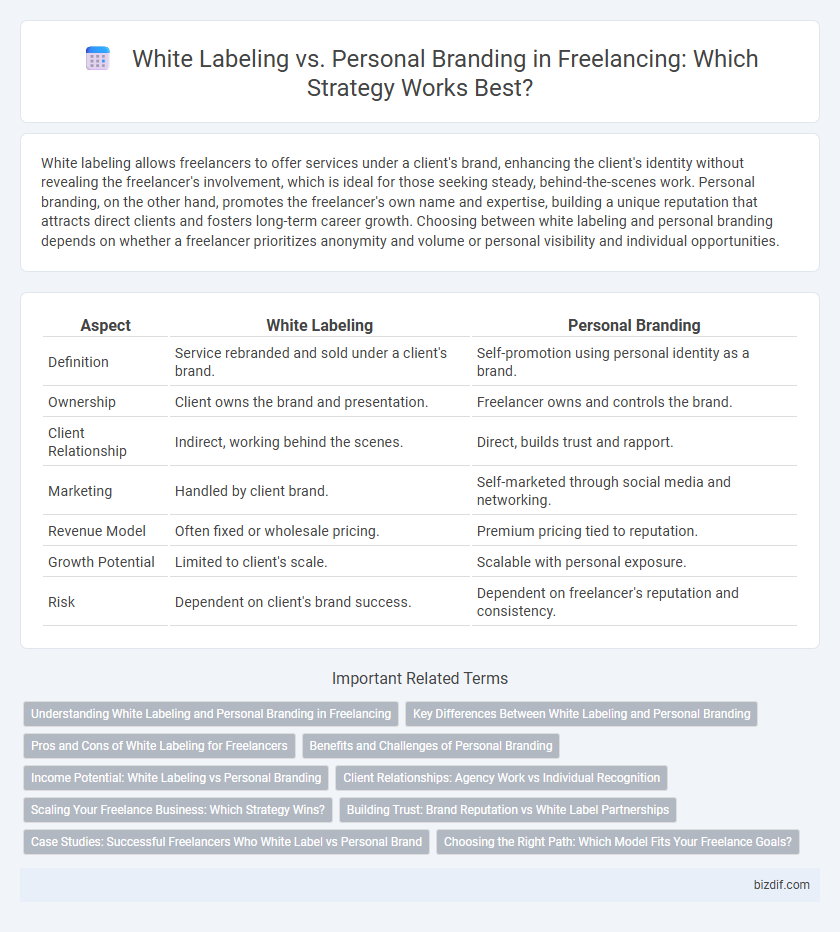White labeling allows freelancers to offer services under a client's brand, enhancing the client's identity without revealing the freelancer's involvement, which is ideal for those seeking steady, behind-the-scenes work. Personal branding, on the other hand, promotes the freelancer's own name and expertise, building a unique reputation that attracts direct clients and fosters long-term career growth. Choosing between white labeling and personal branding depends on whether a freelancer prioritizes anonymity and volume or personal visibility and individual opportunities.
Table of Comparison
| Aspect | White Labeling | Personal Branding |
|---|---|---|
| Definition | Service rebranded and sold under a client's brand. | Self-promotion using personal identity as a brand. |
| Ownership | Client owns the brand and presentation. | Freelancer owns and controls the brand. |
| Client Relationship | Indirect, working behind the scenes. | Direct, builds trust and rapport. |
| Marketing | Handled by client brand. | Self-marketed through social media and networking. |
| Revenue Model | Often fixed or wholesale pricing. | Premium pricing tied to reputation. |
| Growth Potential | Limited to client's scale. | Scalable with personal exposure. |
| Risk | Dependent on client's brand success. | Dependent on freelancer's reputation and consistency. |
Understanding White Labeling and Personal Branding in Freelancing
White labeling in freelancing involves delivering services or products created by another company under your own brand, allowing you to expand offerings without additional development. Personal branding emphasizes building a unique identity and reputation based on individual skills, expertise, and values to attract direct clients. Understanding the distinctions helps freelancers choose strategies that align with their long-term business goals and market positioning.
Key Differences Between White Labeling and Personal Branding
White labeling involves offering products or services created by one company under another company's brand, enabling freelancers to leverage existing solutions without building their own brand identity. Personal branding requires freelancers to develop and promote their unique skills, expertise, and reputation to attract clients directly. Key differences include control over brand identity, client relationship management, and long-term business growth, with personal branding emphasizing direct client trust and white labeling focusing on reselling or embedding third-party offerings.
Pros and Cons of White Labeling for Freelancers
White labeling for freelancers offers the advantage of working under established brands, providing steady workflows and reducing marketing efforts, but often limits creative control and public recognition for their work. This approach can lead to consistent income streams and client trust due to the parent brand's reputation, yet freelancers may struggle with lower profit margins and lack of direct client relationships. White labeling suits freelancers prioritizing operational stability over building personal brand equity in competitive markets like graphic design or digital marketing.
Benefits and Challenges of Personal Branding
Personal branding empowers freelancers to showcase unique skills and build trust with clients, leading to increased visibility and premium project opportunities. Challenges include consistent content creation, maintaining a professional online presence, and managing reputation across multiple platforms. Effective personal branding differentiates freelancers in competitive markets by highlighting authenticity and expertise.
Income Potential: White Labeling vs Personal Branding
White labeling offers scalable income potential by leveraging established client bases and allowing freelancers to focus on delivery without marketing, often resulting in steady, project-based revenue. Personal branding, however, can command premium rates and long-term client loyalty by building a unique reputation, leading to higher earnings through direct client relationships and exclusive projects. Choosing between white labeling and personal branding depends on whether the priority is consistent workflow or maximizing income through personal market differentiation.
Client Relationships: Agency Work vs Individual Recognition
White labeling fosters strong client relationships by delivering work through an agency identity, ensuring consistent quality while the client's brand remains front and center. Personal branding emphasizes individual recognition, building trust and loyalty with clients directly linked to the freelancer's expertise and reputation. Agencies often benefit from scalable client networks, while personal branding provides a unique, personalized connection that drives repeat business and referrals.
Scaling Your Freelance Business: Which Strategy Wins?
White labeling enables freelancers to scale quickly by offering scalable services under another company's brand, reducing marketing efforts and expanding client reach efficiently. Personal branding, however, builds long-term client trust and authority, attracting higher-paying projects but requiring consistent self-promotion and time investment. Choosing between white labeling and personal branding depends on whether immediate growth or sustainable, premium positioning aligns best with your freelance business goals.
Building Trust: Brand Reputation vs White Label Partnerships
Building trust in freelancing hinges on brand reputation and transparent client relationships. Personal branding fosters direct credibility by showcasing individual expertise and consistent quality, creating a loyal client base. White labeling relies on proven partnerships and discreet service delivery, allowing freelancers to leverage established reputations without direct exposure.
Case Studies: Successful Freelancers Who White Label vs Personal Brand
Case studies reveal that freelancers who white label consistently secure larger contracts by offering scalable, client-branded solutions, exemplified by agencies like Design Pickle. In contrast, personal branding leads to higher individual recognition and premium pricing, as seen with freelancers like Neil Patel, who leverage personal authority to attract direct clients. Both strategies demonstrate success, but white labeling emphasizes team capacity and client anonymity while personal branding centers on individual expertise and trust.
Choosing the Right Path: Which Model Fits Your Freelance Goals?
Choosing between white labeling and personal branding depends on your long-term freelance goals and desired level of visibility. White labeling suits freelancers who prefer working behind the scenes, providing services under another brand, while personal branding benefits those aiming to build a recognizable name and direct client relationships. Evaluating your appetite for marketing, client acquisition, and control over your reputation will help determine the optimal model for sustainable growth.
White labeling vs Personal branding Infographic

 bizdif.com
bizdif.com